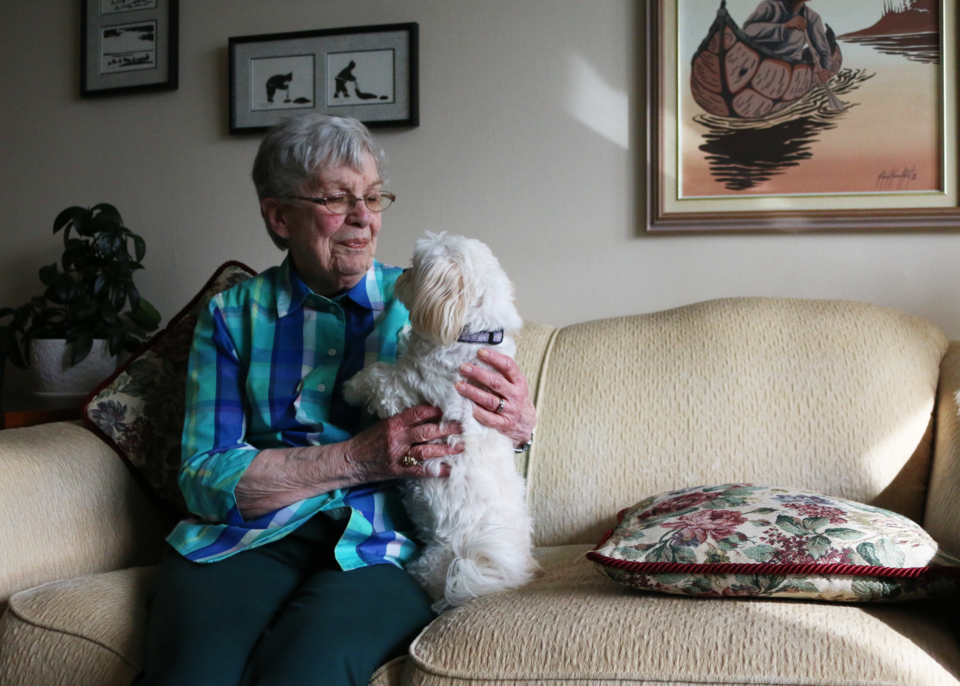Diane Armstrong has no intention of stopping the work she has done for the better part of five decades.
Armstrong began publishing her writing in the 1970s while she was studying photography at Northern College. She became involved with the Timmins Porcupine News, a weekly paper that ran from 1974-78, where she sold advertising for the paper. She later began writing a camping column on the encouragement of one of the paper’s owners, Wayne Green.
Armstrong was not looking to get into journalism — she thinks she might have had a career in music — but journalism found her.
“I did the camping column because I knew I had some good ideas for campfire meals and waterproofing, you know, silly things like that. But I had great English teachers and I had good marks in history,” she says.
Armstrong would later work as a stringer for CBC Sudbury for about 13 years and did a weekly column on seniors for CBC’s noon radio show on the request of its host, Wolf Hess.
“We were wintering in Florida, so I would go to the University of South Florida and tape my column, then send it up to Sudbury by Purolator. Really an archaic way of doing things,” Armstrong says.
One of her former colleagues at the Timmins Porcupine News, Heather Campbell, later gave her a tip about an opening for a columnist at The Daily Press.
“I said, ‘Go for it,’ and she said, ‘Oh no, I mean you.’ And then she kept after me,” she says. “I thought, a column a month for three months and I won’t hear from Heather anymore. But it went weekly right away. That was in 1998, and I continued my weekly column through deaths in the family, illnesses. I didn’t even miss a column when they airlifted me to Sudbury.”
Her column, Over the Hill, began with Armstrong sharing personal musings about the Porcupine area. It was a subject she knew well, having grown up there. Over time she expanded to Timmins, then other places she had lived and spent time in. She dipped into local history and her own memories — summers in Haileybury with her grandparents, visiting the farmer’s market on the wharf, living in Matabitchuan, where the population consisted of “17 people and 21 dogs”.
Armstrong now publishes her writing on various Facebook pages for towns all over northeastern Ontario; Latchford, Cobalt, Timiskaming, Englehart, Kirkland Lake, and Matheson among them. Over the Hill now lives on the All Things South Porcupine Facebook page. She says she has been asked to write about Kapuskasing and Hearst, but doesn’t want to accept until she has done enough research about those areas to make it a column worth writing.
Much of Armstrong’s writing focuses on local history — the personal, the forgotten. She has published four books compiling some of her best works, and the kind of stories that have been disappearing in an ever-evolving media landscape. Since Armstrong started in the industry, media outlets have come and gone— or downsized significantly — and jobs have disappeared. The same work once produced by an entire newsroom is now often the job of a single person on a laptop at their kitchen table. The way we consume information is almost unrecognizable from 26 years ago, as is the way we record it.
“Some things that are old are good,” Armstrong says.
“Now you have all your pictures on a device, and you don’t know how long they’re going to be in the cloud or when your system has been declared obsolete. Stories that you can get from the media when you’re looking up your ancestors and you find out that Great Uncle Clarence, who wasn’t all there, wasn’t all there because he was kicked in the head by a horse. These stories made the papers. There’s nothing in today’s media that tells a personal story, one that you can put in a scrapbook.”
“Is it necessary? That depends on who comes after us and wants to know,” she says.
Armstrong has remained dedicated to her column for the past 26 years. She continues writing even after retiring from the paper just last fall and celebrating her 86th birthday earlier this month and has no intention of slowing down.
“I don’t get paid for it, but I love it anyway. I intended to continue writing because that seems to be a part of me. And doing the research at my age keeps my mind sharp,” she says.
“As long as I can do the research and be assured that my mind is still OK. But when you get to this age you see your peers not just with dementia, but failing memories and failing abilities. I’m lucky. I’m still driving, my health is good, I still do my own cooking. I can still read and I can still buy books.”
“I’ll keep going as long as I’ve got a sharp mind. I had a particularly bad diagnosis a few years ago and I told the doctor, ‘I’m not ready to cash in my chips, there’s still too many people in this world I gotta piss off first!’"



